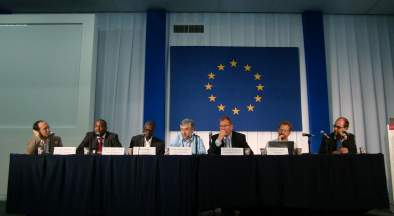GWP Chair Dr. Letitia A. Obeng was on a panel at a side event called “Adaptation: A Little Less Conversation and a Little More Action,” organized by the World Bank and the National Water Commission of Mexico (CONAGUA). A film was shown prior to the panel debate which showed peoples’ experiences around climate change adaptation in the Dominican Republic and some countries in Africa.
Dr. Obeng initiated her contribution by emphasizing that water should not be seen as a sector, “the word ‘sector’ came from the relation to water supply and sanitation,” she said, adding that “water is a natural resource, not a sector.” She said it was important for water resources professionals to start distancing themselves from the word ‘sector.’
Dr. Obeng also explained that GWP supports countries and communities to develop strategic approaches to water management. This is done through Country Water Partnerships helping countries develop approaches to sustainable water management, and thinking through solutions that address equity, the environment and economic development.
“GWP Zambia has being working very closely with the government, integrating the water resources management approach,” said Dr. Obeng. “They have managed to integrate that into the National Development Plan, and brought together the National Adaptation Programmes of Action with Integrated Water Resources Management Plans. These two issues are integrated into national development, and this is something very real, because it is being supported and followed up.”
 Mr. Alex Simalabwi, GWP Senior Network Officer and Climate Change Focal Point, spoke at a side event convened by the German Technical Cooperation (GTZ), which was held at the EU-Pavillon. Participants presented ideas about how climate impacts can be managed to ensure sustainable urban service delivery.
Mr. Alex Simalabwi, GWP Senior Network Officer and Climate Change Focal Point, spoke at a side event convened by the German Technical Cooperation (GTZ), which was held at the EU-Pavillon. Participants presented ideas about how climate impacts can be managed to ensure sustainable urban service delivery.
Mr. Simalabwi mentioned that GWP’s support is important in order to provide water governance and decentralization of water management at the local level. “We are trying to encourage countries to building capacities of institutions at a very local level,” he said. He used examples of experiences in water resources management to improve water efficiency from GWP in Pakistan, Southern Africa and the Caribbean.
Mr. Simalabwi argued for the importance of integrating water security, climate resilience and urbanization issues into urban development planning as well as into national development planning processes. Such integration requires coordination and in particular the support of governments that have the authority and mandate to get all the stakeholders together.

